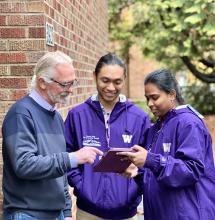Sara Curran, Jerald Herting, Nathalie Williams, and Zack Almquist are leading a team of sociologists, and graduate and undergraduate students in an interdisciplinary study called the Sound Data pilot. The program includes a diverse team of UW investigators with expertise in sociology, geography, anthropology, public health, social work, demography, and public policy.
Using innovative respondent driven sampling, initial data was collected from 280 people experiencing homelessness in the Puget Sound area. This research is one of the few survey collections of people experiencing homelessness in the country based on a representative sample appropriate for statistical analysis.
Most studies of people experiencing homelessness ask questions related only to living without a home. But this study differs because it includes relevant questions and topics related to social, economic, and personal life—questions generally asked of the housed population but excluded when studying the homeless population. With this wide variety of data on many aspects of life, Sound Data is poised to provide relevant data on issues that have rarely been explored and documented.
Additional questions and data cover a wide variety of topics, from demographic characteristics, family, and social support, to employment, income, and financial hardship; health and well-being and health behaviors; religion and political beliefs; housing, citizenship, and languages.
Planned outputs from the initial phase of the project includes a report and presentation to be shared with city, county, and regional officials (as well as posted to the UW Sound Data website) and academic articles that address both innovative methodologies and analysis of substantive topics on the Puget Sound region’s homeless population.
The goal of this innovative methodology and research is to use the Sound Data project as a vehicle for undergraduate and graduate training and to foster new research by our graduate students. The team hopes to provide detailed observations and data about our quickly changing population to share with policy makers and community leaders.
